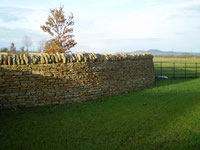
Dry stone walling stone
We are a supplier of dry stone walling, and walling stone throughout the West Country, and upto the Cotswolds.
Stone wallers use our dry stone due to its supreme quality. It is easy to build good looking, stable dry stone walls fast, with, or without mortar, or a backing block.
Our walling stone is also ideal for retaining walls, and large, long lasting estate dry stone walls that will make an impression.
Our walling stone is:
- Hard
- Flat
- Cropped and dressed to have at least one straight face
The dry stone walling has a large amount of through stones (upto about 18 inches) helping with stability. This makes it ideal for the construction of estate walls that are not only beautiful, but are also substantial in size and presence.
We can also provide coping stones, cock and hens, as well as base stones. These will all help with the stability of the wall, as well as the all important aesthetics.
Each stone is ready to pick up, and put straight into the dry stone wall. Minimising the selection, and dressing of the stone, thus lowering the cost of the build.
Furthermore the rich colours or browns, buffs and green/greys create a mottled colour, blending naturally with the landscape.
For smaller dry stone walls, or when using a backing block, use our 7 inch or 10 inch cropped walling. Lime mortar can be used with this smaller walling stone. The mortar can be recessed back, giving a dry stone effect.
Have a look at the price per tonne.
If you want to discuss your plans, phone the Quarry on 01963 364200
Dry stone walling projects
In the past 25 years, we have provided stone for some of the largest dry stone walling projects in the country, that are literally ground-breaking. The Newt, near Bruton is an excellent example where there are several miles of drystone walls built through the parkland. Much of the drystone walling at the Newt has been done with stone supplied by Stalbridge Quarries, and built by Tom Trouton.
Have a look at this interview with Tom by Country Life. The Forest Marble stone used is our stone:
The art of drystone walling is very much alive. It is an art, it makes a statement, it is entirely natural, and is highly practical. These beautiful structures, that are of the landscape, will add huge value to a property.
Drystone walling, and building has been used for thousands of years in the UK, and can be seen in the brochs of the Orkney Islands, withstanding the elements for several thousand years. The caveat to drystone walling is that the stone needs to be hard and flat, and you need a good drystone waller.
Look at our photos.
If you want to discuss your plans, phone the Quarry on 01963 364200




Dry stone walls defining landscapes
Dry stone walls are one of the earliest forms of construction, that has defined many of landscapes over the past centuries. Dry stone walls are simple (needing only stone and craftsmanship), but highly effective, lasting hundreds of years.
The Cotswolds, the Purbecks, the Mendips, the Dales, and Cumbria are a few of the iconic regions in the country that have been defined by drystone walls. It is worth noting that our stone is a type of Cotswold walling stone. We deliver our Cotswold walling stone not only to Wiltshire, but also upto, Gloucestershire, and Oxfordshire.
These traditional walls are works of art, relying on the craftmanship of the drystone-wallers to utilise the available stone to create a permanent barrier that will prevent livestock escaping in an often hilly, or mountainous landscape.
Today our drystone is used in gardens, estates, and farms creating walls that mould with the landscape, and environment. It is the very nature of dry stone walling that enables it to sit easily within the environment. An entirely natural construction, just using stone, gravity, and supreme craftmanship.
Traditionally, no mortar was used, relying on high quality stone, and craftsmanship to harness gravity to produce a stable, and strong wall that would last generations. Today, builders, and stone mason often use a lime based mortar, recessed back, to provide extra stability. This can be taken further when using cropped walling, where a backing block can be added.


 Stalbridge Quarries
Stalbridge Quarries






